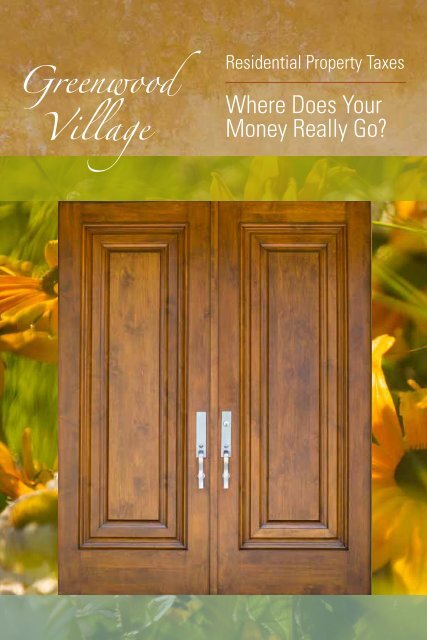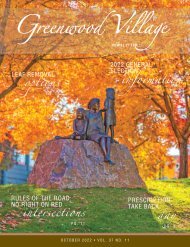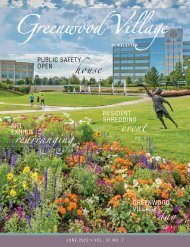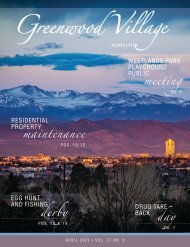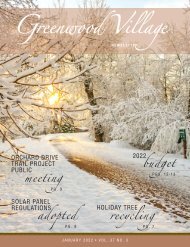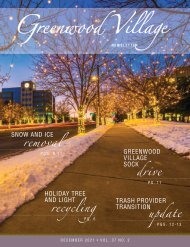GVpropertyTaxDoorsOnlineVersion
Create successful ePaper yourself
Turn your PDF publications into a flip-book with our unique Google optimized e-Paper software.
Greenwood<br />
Village<br />
Residential Property Taxes<br />
Where Does Your<br />
Money Really Go?
Property<br />
Taxes Provide<br />
Essential<br />
Services to<br />
the Community
Property Taxes<br />
It Pays To Own<br />
Achieving the American Dream of home ownership is one of a citizen’s greatest<br />
accomplishments. With all the benefits of home ownership, you also have expenses to<br />
maintain your home. Above and beyond the mortgage payment, your annual payment of<br />
property taxes gives you a true picture of what your home actually costs.<br />
Property tax is a tax that a homeowner pays on the value of a residential home and land.<br />
Property taxes are governed by state law, but collected by the Arapahoe County Assessor<br />
on behalf of various entities to provide services and fund infrastructure improvements in<br />
the community that directly benefit you and your family.
The Appraisal Process<br />
The Assessor’s Value Of Your Property<br />
Values are most often determined by comparing your property with properties that are<br />
similar in location, design, size, age and amenities within your neighborhood. The value<br />
placed on your property for the year 2015 was based on sales between January 1, 2013<br />
and June 30, 2014, utilizing the Sales Comparison Approach. The Sales Comparison<br />
Approach includes the assessor’s evaluation of similar properties to arrive at a value for<br />
your property. The sales must have occurred during the 18-month period prior to and<br />
including the appraisal date of June 30. If a sufficient number of sales is not available<br />
during the 18-month period, the assessor may go back in six-month intervals up to a<br />
maximum of five years to collect the required number of sales needed to set values.<br />
The Value Of Your Property May Change If You:<br />
• Finish new rooms in a basement or attic<br />
• Conduct extensive remodeling and modernization<br />
• Demolish or add a garage, carport, storage shed, or other structures<br />
• Add more square footage<br />
Colorado law requires all assessors to reappraise all<br />
real property including land and improvements every<br />
two years during the odd-numbered years.<br />
Fire And Rescue
Schools And Libraries<br />
Breaking Down The Tax<br />
Actual Vs. Assessed Value<br />
The actual value of property is not the taxable value. The taxable value is a percentage of<br />
the actual value. The percentage is called an assessment rate and the resulting value is<br />
called the assessed value. Property taxes are calculated by multiplying the actual value<br />
of the property by the assessment rate and then by the total mill levy. The residential<br />
assessment rate is currently 7.96 percent. The assessment rate for all other property,<br />
including vacant land, is 29 percent.<br />
Actual Value x Residential Assessment Rate x Mill Levy = Taxes<br />
$500,000 x 7.96% x 0.083872 = $3,338.11
What’s In A Mill?<br />
A mill levy is the “tax rate” that is applied to the assessed value of a property. One mill<br />
is one dollar per $1,000 dollars of assessed value. Mill levies are determined by each<br />
individual taxing authority such as the school, county, city, fire, water, sanitation, and<br />
recreation districts. A property owner’s total mill levy will depend upon the districts<br />
in which their property is located. County taxes are levied by the Board of County<br />
Commissioners and city taxes are levied by the City Council. Special district taxes are<br />
levied by their board of directors, and school taxes are levied by school boards. In<br />
addition to each city like Greenwood Village establishing its own mill levy, there are<br />
additional mill levies for given districts outlined on your property tax bill.<br />
A Sample Property Tax Statement $500,000 home value<br />
Taxing Entity Tax Levy Amount<br />
Arapahoe County 13.856 $551.47<br />
Arapahoe Library District 5.916 $235.46<br />
Cherry Creek School District 49.703 $1,978.18<br />
City of Greenwood Village 2.932 $116.69<br />
Developmental Disability 1.000 $39.80<br />
Regional Transportation District 0 0<br />
South Metro Fire Rescue 9.344 $371.89<br />
Southgate Sanitation District 0.510 $20.30<br />
Urban Drainage and Flood Control District 0.553 $22.01<br />
Urban Drainage and Flood Control District (S. Platte) 0.058 $2.31<br />
Total 83.872 $3,338.11<br />
Did you know that Greenwood Village’s mill levy has<br />
remained constant since 1997? Prior to 1997, the<br />
Village increased its mill levy two times.
Police Services<br />
Greenwood Village Portion Of Your Property Tax<br />
The Village’s mill levy of 2.932 accounts for less than 4% of the average resident’s<br />
property tax rate. Therefore, on a home valued at $500,000, the Village receives roughly<br />
$117 of the resident’s total annual property tax payment.<br />
In addition, the property taxes collected are included in the Village’s general fund<br />
revenues to provide essential services to citizens. From total city-wide revenues of<br />
almost $47 million, the Village receives approximately $3 million from property taxes.<br />
Of that, 32%, or just shy of $1 million, is attributable to residential properties.<br />
Arapahoe County 17%<br />
Arapahoe Library<br />
District 7%<br />
Other 2%<br />
Cherry Creek School District 59%<br />
South Metro<br />
Fire Rescue 11%<br />
City of<br />
Greenwood<br />
Village 4%
City-Wide Revenue<br />
Lodging Tax 3%<br />
Sales/Use Tax 67%<br />
Occupational<br />
Privilege Tax 3%<br />
Non-Tax Revenue 20%<br />
Property Tax 7%<br />
Greenwood Village has one of the lowest municipal<br />
property tax rates in the metro area.<br />
Roadways And Transportation
Tax Time<br />
When Are Property Taxes Due To Arapahoe County?<br />
Property tax bills reflect the taxes due for the preceding year and are mailed after<br />
January 1. Tax amounts greater than $25 may be paid in one payment by April 30 or in two<br />
equal payments. The first half payment is due by the last day of February. The second<br />
half payment is due by June 15. If the tax amount is $25 or less, payment in full is due on<br />
April 30. If your property taxes are included in your monthly mortgage, your lender will<br />
remit payment of your property taxes to Arapahoe County on your behalf.<br />
Notice of valuations are sent to each property owner by<br />
May 1 of each year regardless if property taxes are paid<br />
through your mortgage payment. The value shown on the<br />
notice affects the amount of taxes you pay in January.<br />
Protest And Appeal<br />
If you disagree with the value assigned by the County Assessor, you have the right to file<br />
appeals based on an established process to preserve your taxpayer rights.<br />
Step 1: File appeal to Assessor’s Office by June 1. The County Assessor must send the<br />
taxpayer a decision by the last working day in June.<br />
Step 2: If you are not satisfied with the Assessor’s decision, you may appeal to the<br />
County Board of Equalization by July 15 for real property. The County Board conducts<br />
hearings through August 5. If the County has opted for the extended appeal period, you<br />
must appeal to the County Board by September 15. Under this option, the County Board<br />
conducts hearings through November 1. The County Board must notify you in writing<br />
within five business days of the date of its decision.<br />
Step 3: If you are dissatisfied with the County Board’s decision, you may appeal to an<br />
arbitrator, District Court, or the Board of Assessment and Appeals within 30 days from the<br />
date the decision was mailed.
Property Tax Relief<br />
For Senior Citizens<br />
In the November 2000 election, Colorado voters passed a Property Tax Exemption for<br />
seniors, known as Referendum A. Qualifying seniors see 50 percent of the first<br />
$200,000 of actual value of their primary residence exempted from property tax. To qualify,<br />
at least one owner of a home must be 65 years or older as of Jan. 1 and must have<br />
occupied the home as a primary residence for at least 10 consecutive years prior to Jan.<br />
1 of the year he/she applies. To determine your eligibility or to apply for the property tax<br />
exemption, please call the Division of Property Taxation at 303-866-2371.<br />
For Disabled Veterans<br />
The Disabled Veterans Exemption Amendment was passed in November 2006. The<br />
amendment is an expansion to the senior property tax exemption by including qualifying<br />
disabled veterans. Qualified disabled veterans receive a 50 percent exemption on the first<br />
$200,000 of actual value on their 2015 tax bill payable in 2016 for their primary residence.<br />
The deadline for filing an application with the Colorado Department of Military and<br />
Veterans Affairs, Division of Veterans Affairs, is July 1 of the year in which the exemption<br />
is requested. For instructions, eligibility requirements and an application, call the Division<br />
of Veteran Affairs at 303-284-6077.<br />
Property Tax Questions And Assistance<br />
Arapahoe County Assessor’s Office, 303-795-4600<br />
Visit arapahoegov.com<br />
Drainage And Flood Control
Greenwood<br />
Village<br />
City of Greenwood Village<br />
6060 South Quebec Street<br />
Greenwood Village, CO 80111<br />
Phone 303-773-0252 • Fax: 303-290-0631<br />
Email: thevillage@greenwoodvillage.com<br />
www.greenwoodvillage.com


